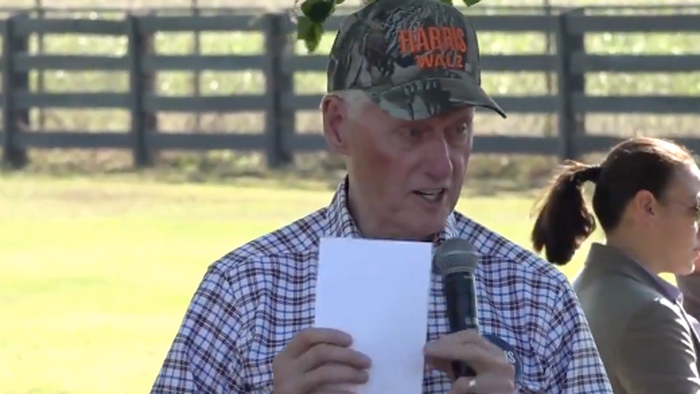Former President Bill Clinton recently made headlines during a campaign event for Vice President Kamala Harris, inadvertently highlighting the devastating impacts of the current administration’s open southern border policies. By acknowledging the tragic death of Laken Riley, a young woman from Georgia who was murdered by an illegal immigrant, Clinton pointedly criticized the lack of effective vetting procedures at the border. His comments suggested that, had there been proper protocols in place, Riley’s murder could have been avoided, essentially laying blame on the Biden-Harris administration for facilitating an unprecedented migrant influx without adequate safeguards. This revelation, coming from a prominent Democrat, sparked considerable discourse about the ongoing immigration crisis and its associated consequences.
Clinton’s remarks shed light on the broader narrative surrounding immigration in the United States. He mentioned that not only did Riley’s death signify a failure in the system but also reflected a larger issue regarding America’s declining birth rate. While emphasizing the need for vetted immigrants to help maintain population levels, Clinton’s observations drew attention to a paradox within Democratic policies, where advocacy for abortion and immigration coexist. As he posited that the U.S. requires vetted immigrants to fill labor shortages, critics pointed out the stark contrast with Democratic rhetoric that often appears to neglect the complexities of these topics.
Reactions to Clinton’s comments have been largely polarized, especially within social media circles. Some users expressed disbelief that a Democratic figure of Clinton’s stature would even acknowledge Laken Riley’s name, recognizing the tragedy while condemning the administration’s prior inaction. Others highlighted the inconsistency of Democratic policies on immigration and population growth, noting that while the call for immigration is strong, it appears at odds with the party’s stances on abortion and family planning. This inconsistency generated further debate regarding the motivations behind current immigration policies and whether they align with the Democratic agenda’s broader goals.
In the wake of Clinton’s statements, former Trump adviser Stephen Miller weighed in to provide context, referring to legislative initiatives established post-Riley’s murder which allegedly expedited citizenship for undocumented immigrants. He noted that the bill’s introduction was emblematic of the careless immigration policies championed by the Biden administration. This commentary added another layer to the debate, suggesting that structural changes in immigration law could have far-reaching consequences for American public safety and social conditions. Millers’s insights resonated with those critical of the current administration’s handling of immigration-related issues, further fueling calls for policy reform.
The potential political ramifications of Clinton’s comments haven’t gone unnoticed. The Trump campaign quickly capitalized on the moment, producing advertisements that featured Clinton’s remarks as a means of drawing attention to perceived failings by the Biden-Harris administration. Such moves reflect an acute awareness in political circles that any misstep or lapse in dialogue from prominent Democrats could be exploited to reframe narratives around critical issues such as immigration and crime. This situation underscores a contentious election environment where the stakes surrounding immigration policy will likely be contested fervently in the upcoming political landscape.
In conclusion, Clinton’s inadvertent acknowledgment of the implications of open border policies serves as a flashpoint for discussions surrounding immigration, public safety, and the Democratic party’s internal contradictions. His comments have incited a wave of discussions about what constitutes a responsible immigration policy, the responsibilities of governing entities, and the tragic consequences of failed policies that impact innocent lives. As the political climate continues to evolve, the interplay between public sentiment concerning immigration and the divergent narratives from both main political parties is poised to shape the discourse leading up to future elections, including the pivotal 2024 race.

